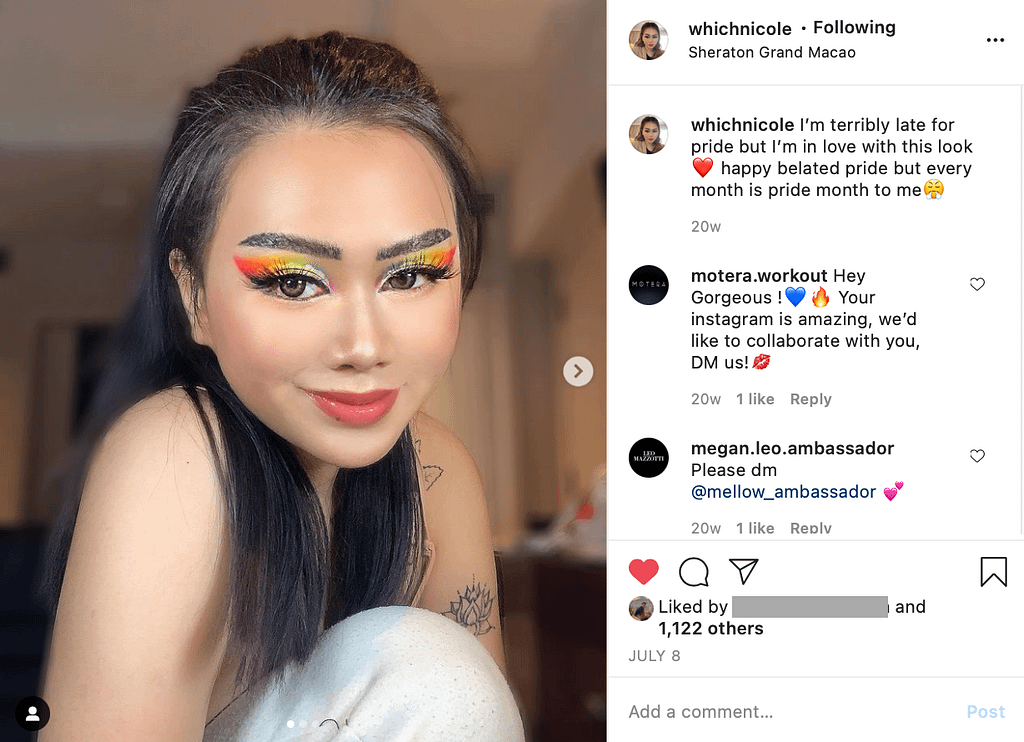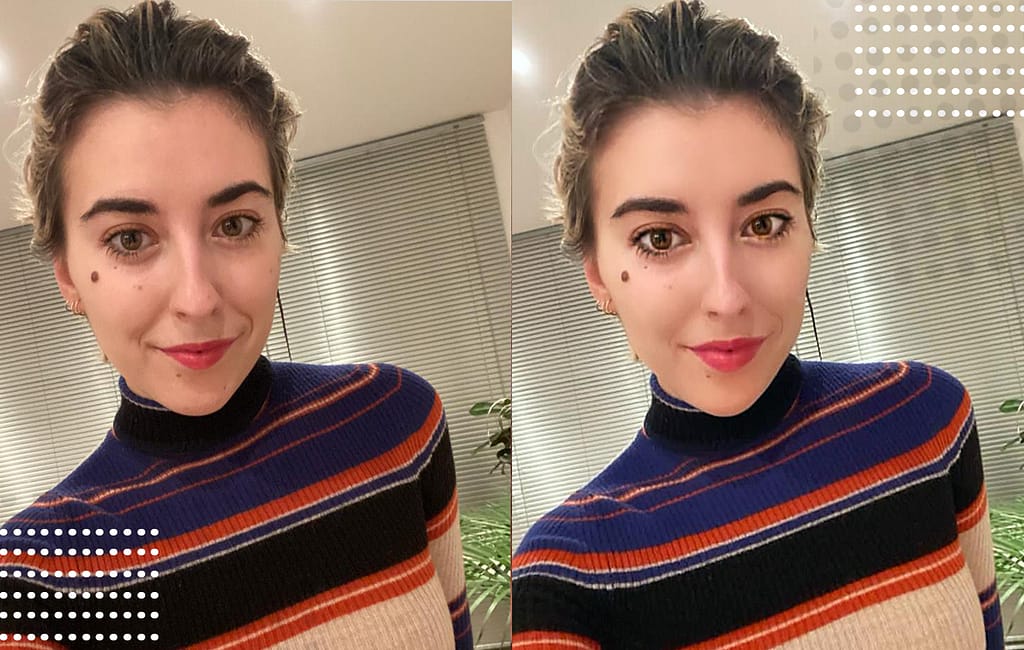People need to be aware that what they see on social media isn’t necessarily real.
Nicole Chan, 22, on how edited social media posts can influence users’ self-esteem.
The impact of social media on its users’ mental health has been a topic of interest for years but has become even more relevant in the midst of the current pandemic. As the usage of messenger apps and social media platforms is going up, tech founders can draw important conclusions for their own startups from studying the steps of established companies like Facebook when it comes to the impact of their technology on users’ well-being.
For this week’s Responsible Tech Insights, we are focusing on the effects people’s online presence has on our life away from the screen. We spoke with Nicole Chan, who gathered an online following of close to 4,000 followers through showcasing her makeup looks. After grappling with the negative aspects of being a public persona, she decided to deactivate her account to take a two-year break from social media platforms.

Let’s start at the beginning: what were your first experiences with social media platforms?
My first experience with social media… I think I must have been eight when I registered on Facebook. Actually, it wasn’t even me who signed up, my mother created an account for me so she could add me as a friend.
I didn’t use the platform until maybe a few years later. I was around twelve when I started posting quite frankly random pictures and status updates. It wasn’t anything like today where hundreds of “friends” see your posts, it was mostly family and people I knew in real life I was connected with anyways. It was a completely different time back then. Social media is an entirely other environment today.
For example when I downloaded Instagram as a young teen I thought it was a photo editing app at first. The app was fairly new back then and I assumed the main feature was the filters you could apply to your images. What I didn’t know was that every time I edited and saved pictures, I was simultaneously posting them publicly on my profile. I only realised my feed was public after one of my friends eventually commented on one of my posts. It might seem silly now but that’s how much of an uncharted territory social media was back then.
Ah, that’s tricky. Do you recall any other negative experiences?
Well, as teenagers we started using messaging apps. MSN Messenger was very popular in Macau, an autonomous region on the south coast of China, which is where I’m from. But at one point some of us also registered on American dating websites, we must have been around thirteen at the time. We used fake profiles of course and were essentially trolling people, pretending to be somebody else. Looking back it was clearly reckless but none of us really thought it was dangerous at the time.
We also had a “Gossip Girl” copycat in Macau. They anonymously posted private details in a very harsh way on their Facebook page, just like in the TV series. Even years later we don’t know who was behind the account, though my friends and I have a hunch. Thankfully I was never written about but a lot of my friends got mentioned. Their names were slightly changed but we all knew who the posts were about.
There was a post about somebody I knew who had broken up with their boyfriend but ended up sleeping with his best friend. Very standard teenage drama. But it was posted publicly on Facebook, for everybody to see, the next day. It must have been incredibly humiliating for her, especially since somebody she knew well probably sent in the tip.
This was a while ago and at this point, we’re using social media in a completely different way of course. Today I’d say we mainly see these platforms as a way to build our reputation and portray ourselves to others in a certain way. And a lot of times this environment can get quite toxic too, I’m not going to lie.

What features of social media contribute to this environment in your opinion?
For me, I^d definitely say it’s the addictiveness of it. For example, when I meet people in real life and follow them on social media later, I keep checking if they follow me back and get a bit anxious if they don’t. It’s like some sort of stamp of approval. Did they really enjoy talking to me if they don’t follow me back?
Actually, this is a good indicator of how seriously people take themselves online. If they follow me back instantly they’re usually great to communicate and connect with, they’re more carefree about their image online. But the ones who take their time tend to be more shallow and see it more from a cost-benefit perspective. It can be genuinely exhausting and experiences like these led me to decide to take down my profile for about two years.
Could you tell me a bit more about the reasons behind shutting your account down?
So, it was mostly the pressure to keep up with creating better and better content. I was constantly trying to one-up myself, even though I’m not even an influencer with hundreds of thousands of followers. I felt under pressure and it simply wasn’t enjoyable anymore. I got incredibly fed up with it.
I switched to using an account where I only followed my closest fifty friends. I hardly posted anything there, it was mainly to keep in touch with them. At first, a lot of people didn’t understand why I would deactivate my account if I had a lot of followers but it was never about that, metrics didn’t actually matter to me.
But you re-activated your account again, right? What has changed in your approach to social media since then?
Yes, I did. At this point when I scroll through my feed and see other people’s perfect bodies it doesn’t matter to me anymore. I’m way less likely to be negatively influenced by it because I gained perspective and know that what I’m seeing online probably isn’t real anyways. I use apps like FaceTune, I know how to get the perfect body, the perfect face. One swipe here, one swipe there…
Speaking of, I actually edit my photos way less than I used to too. I started feeling more confident about my body. Nowadays I only add a subtle natural filter with a skin-smoothing feature and maybe slim my jaw a bit. Models on billboards have been edited by professional photographers for decades. The only difference now is that it’s relatively easy to access and use these editing tools.

What’s your take on photo editing apps like FaceTune in general?
I think it’s important for users to know how widely these filters are used on social media nowadays. I have a disclaimer on my profile where I clearly state how edited my pictures are. The way I look in my posts isn’t how I actually look. But if you don’t know that’s the case, you’re bound to compare yourself to an unrealistic beauty standard.
I’ve had friends come up to me to tell me that they deleted Instagram because it made them feel horrible. It made them think they needed to drastically change their looks and it really wasn’t healthy for them. But online platforms shouldn’t have such a negative influence on their users. You should open an app and feel motivated or happy, not insecure about yourself.
Anything else you’d like to say to wrap up our conversation?
I think people need to be aware that everything they see online is very superficial. What they see online isn’t necessarily real. Everybody’s putting out the best version of themselves, nobody’s an exception. If you look at your own profile you’re most likely creating a curated picture for others to see.
At the end of the day what matters most when you use these platforms is how you feel afterwards. Social media should make you feel good. It should be used to connect with people, to raise awareness of important issues, to keep in touch with friends from all over the world. Technology should add something positive to your life. Period. Because if it doesn’t, what’s the point of using it in the first place?
If you want to find out more about your startup’s status quo when it comes to health risks and other topics such as business ethics or technology design, take the Responsible Technology Assessment here – it only takes 15 minutes!
